|
|
|
|
Harry
Potter and the Chamber of Secrets
|
 |
|
A defining moment in the history of cinema occurred for me last Christmas. Passing a city multiplex, I realised with horror that only two films were on show: Harry Potter and the Philosopher's Stone (2001) and The Lord of the Rings: The Fellowship of the Ring (2001). Here at last was sad proof of what commentators had been direly predicting for so long: in a corporate-run world, more cinemas means fewer films, and the virtual elimination of consumer choice. But, as with every blockbuster movie event, the juggernaut of hype, merchandising and saturation-booking has to be distinguished from the film itself. Do the Harry Potter films, closely adapted from J. K. Rowling's novels by director Chris Columbus (Mrs Doubtfire, 1993) and writer Steve Kloves, amount to much? While Peter Jackson and his collaborators struggle to translate the grand, convoluted moral precepts of The Lord of the Rings to the screen, Columbus and Kloves can settle for less. The evolving Harry Potter tale grabs bits and pieces from various mythological systems (especially the life of Christ for The Philosopher's Stone), but is mostly about secular, earthbound issues: friendship, loyalty, maturity. As the cast rapidly grows older, all the scenes devoted (often humorously) to these young witches and wizards learning to control their powers start to resemble a reassuring instruction manual for kids on how to survive puberty. On the one hand, Chamber of Secrets is a definite improvement on The Philosopher's Stone, because there is no longer any need for a laboured exposition of the characters and their fantastic world. On the other hand, the second film in the series is already starting to play like a too-comfortably familiar episode of a long running sitcom – especially at the start, when we are again treated to the indignities suffered by Harry (Daniel Radcliffe) at the hands of Uncle Vernon (Richard Griffiths) and Aunt Petunia (Fiona Shaw). But there are some new characters. The best of them is Gilderoy Lockhart (Kenneth Branagh), a preening celebrity-seeker. Branagh's mannerisms are these days almost too large for any naturalistic role, but this part shows off his boundless theatricality to its best advantage. No report on the new Harry Potter film is complete, it seems, without a regurgitation of the studio's favourite publicity line that it is "darker and edgier" than its predecessor. (Meanwhile, exactly the same phrase is being used to promote both the second Lord of the Rings movie and the James Bond adventure Die Another Day, 2002). Chamber of Secrets lays claim to darkness in two ways. Firstly, it is more like a horror movie than the original Harry Potter. The secret passages and chambers in Hogwarts School contain foul deeds, scary monsters and a rather endearing ghost called Moaning Myrtle (Shirley Henderson). In one impressive spectacle, a Whomping Willow tree comes to life as in Sam Raimi's Evil Dead (1982), wreaking damage upon a car containing Harry and Ron. More daring and intriguing is the film's second appeal to darkness: its insistent appeal to imagery and situations involving anality. The hushed, symbolic talk about pipes and chambers eventually becomes literal when a major piece of the plot is centred on a gruesome episode that once took place in the girls' toilet. Rowling has here hit upon a winning ingredient in much literature for children: the more scatological, the better. Harry's adventure this time around could almost be subtitled with the title of a popular (and lightly controversial) Australian novel for kids, The Day My Bum Went Psycho. The big problem with the Harry Potter films – which can only compound with each future instalment – is the sparseness of the series' creative imagination. The movies, like the books, have a mere handful of novel tricks (creatures, flying broomsticks, living photographs, the magical Platform Nine and Three Quarters) that are repeated over and over without variation or development. One wonders how the next director in line, Alfonso Cuarón (Y tu mamá también, 2001), will be able to make room for his considerable talent. Of course, every generation tends to believe its collective childhood was filled with a more imaginative and inspiring art than the popular culture that now infiltrates the minds of younger folk. The Harry Potter series may lack the earnest, mystical pretensions of Tolkien's The Lord of the Rings, but I vastly prefer it to the bland space-melodrama of the Star Wars cycle. Nonetheless, I am still waiting for the cinema to tackle Mervyn Peake's Gormenghast book trilogy. MORE Columbus: Bicentennial Man, Nine Months, Only the Lonely, Stepmom © Adrian Martin November 2002 |
![]()